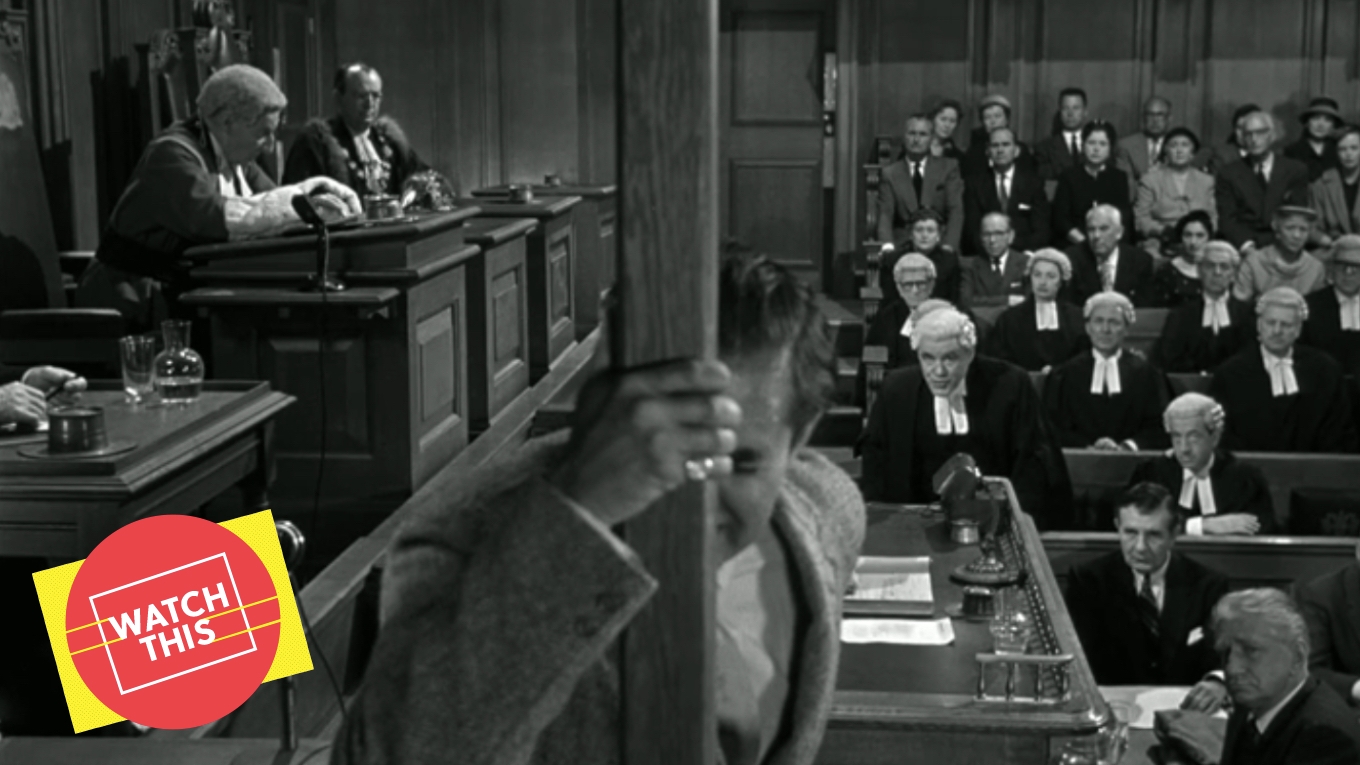Billy Wilder took on Agatha Christie for a one-of-a-kind courtroom drama

Watch This offers movie recommendations inspired by new releases, premieres, current events, or occasionally just our own inscrutable whims. Because the new Conjuring movie didn’t scratch our itch for (supernatural) legal fireworks, we’re coping with five days of courtroom dramas.
Witness For The Prosecution (1957)
Neither Billy Wilder nor Agatha Christie were particularly known for courtroom dramas, which makes Witness For The Prosecution an odd, delightful standout in both their careers. Christie’s short story “The Witness For The Prosecution” was turned into a hit play of the same name four years before the film. It was Marlene Dietrich who brought it to her friend Wilder, saying that if he would direct it, she would star in the title role.
Credit Dietrich for knowing a perfect fit when she saw one (and snagging top billing ahead of formidable co-stars Charles Laughton and Tyrone Power). The enigmatic German actress was the ideal performer to play the mysterious Christine Vole. In post-war London, Leonard Vole (Power) is a charming, caddish American accused of murdering an older, wealthy woman that he’s been spending time with. His only hope is the alibi of his ostensibly devoted wife. But when Vole’s barrister, the prominent defense attorney Sir Wilfrid Roberts (Laughton), interviews Mrs. Vole, she curiously doesn’t seem to care if her husband is sent to the gallows or not. The root of her indifference follows a corkscrew path of plot turns that are head-spinning even by Agatha Christie standards, resulting in a series of revelatory climaxes.
Wilder knew that Christie was excellent at crafting the arc of a story, especially with those twists she was bound to drop toward the end. But her work sometimes lacked audience-pleasing intricacies of dialogue and character. (As the director put it to Cameron Crowe in the book Conversations With Wilder, “She had structure, but she lacked poetry.”) This is where Wilder and his collaborators stepped in, making it so that the screen version of Sir Wilfrid was recovering from a heart attack and gifting him with an incessantly cheerful but stern nursemaid, Miss Plimsoll, played by Laughton’s wife, Elsa Lanchester (best remembered as The Bride Of Frankenstein). The humorous barbed interplay between the pair (Plimsoll: “We better go upstairs now, get undressed, and lie down.” Sir Wilfrid: “We? What a nauseating prospect.”) helped offset the taut dramatics of the courtroom case.
Wilder shot Witness in black and white, and the starkness of the palette seems to underline the obdurate rules of English law, even as various grays begin to emerge. Technicolor would have been wasted on the gloomy London landscape and on the austere courtroom where more than half of the film unfolds. Many of the theatrical tropes of the genre are on full display: the barrister murmuring a question to prove a witness is hard of hearing; the purposeful misidentification of vital evidence; the unrestrained dramatic protests of the accused, vainly trying to prove his innocence. But the heart of the movie is Sir Wilfrid and Miss Plimsoll, his constant nuisance. Wilder credited Laughton’s “tremendous presence,” not just when hurling dagger-like inquiries at the witness stand but also during moments of charming mischief—hiding cigars in his cane, substituting brandy for cocoa in his thermos—conceived for the screen version of the character. Wilder creation Miss Plimsoll, savvy to all of Wilfrid’s subterfuge, refuses to give up on her charge, just as Wilfrid obsesses about the Vole case even with his health in the balance.
Just like Psycho a few years later (and in fact, Alfred Hitchcock later remarked that people often assumed that he had directed this film), Witness For The Prosecution instigated an urgent campaign to keep the movie’s shocking ending from the public—by not seating people within the final 10 minutes, for example. In the trailer, Laughton cautions audiences to preserve the twists for their friends, “because you won’t want to spoil their excitement and their fun.” But thanks to Wilder, there’s fun to be had in all of Witness For The Prosecution, not just in the jaw-dropping finale that was a Christie speciality.
Availability: Witness For The Prosecution is currently streaming on Amazon Prime and Tubi (with ads). It can also be rented or purchased digitally from Google Play, Apple TV, YouTube, Microsoft, and VUDU.